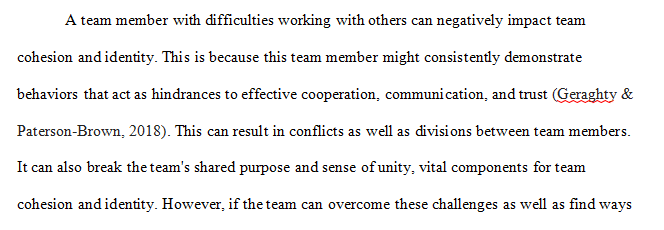MBA4302 Module 4
read the case study below, and 2) write your discussion/reactions on the three questions after the case study; 3) please also provide your comments on at least two classmates’ reactions.
DISCUSSION RUBRIC:
The rubric for discussions can be viewed by clicking the three dots (top right) and selecting Show Rubric. Please read it carefully to understand the expectations for
Two hundred years ago, the term prima donna had only one meaning. The prima donna was the lead female singer of an opera, the most talented performer on the stage and the focus of the show. In modern times, the phrase rarely refers to an opera singer. Yet many of the traits of a lead opera singer still apply to modern day prima donnas in the workplace. Prima donnas enjoy being heard. A prima donna employee may talk over others to make sure their ideas are heard during a meeting. Prima donnas also enjoy being the center of attention and may be very difficult to work with on a team. Like the prima donnas of two hundred years ago, these employees may be extremely talented. Many workplace prima donnas are “star” employees with very high individual performance. An egotistical employee may have a bigger ego from years of success, despite having trouble working with others.
It may be hard to imagine why a manager may hire or promote an employee who is not a team player. As teams become more popular, jobs that don’t require considerable teamwork are becoming rarer. Yet there are still situations where hiring a star versus a team player may seem less detrimental. There are roles that require more solo work than team work. Some teams may have joint goals but less interdependent tasks. This could help team members receive credit for their own contributions, despite the “star” employee’s attention-seeking ways. There are also many cases where hiring an employee who has great abilities but poor teamwork skills may be the best decision for the company. Hiring a more disagreeable applicant with a rare skill set in a hard-to-fill position may be easier than hiring an applicant who would have to be trained extensively. Adding a salesperson with a great sales record and extensive personal contacts to a sales department can help the organization grow and prosper. Even on professional sports teams, it may be tempting to hire a player with amazing stats but a terrible attitude toward working with others.
Hiring an employee who does not work well with others, even if it is only one employee, can also have its drawbacks. As we learned in the chapter, relationship conflict is almost always dysfunctional. The conflicts that these employees create could lead to a loss in productivity. Employee morale and job satisfaction of other team members may also be affected if one of their teammates frequently undermines their contribution or makes sure to receive more attention from their supervisor. If employees feel unhappy, they may be more likely to leave or to engage in counterproductive work behaviors.
QUESTIONS TO DISCUSS:
- Think of some of the processes we learned about in this chapter, such as team identity and team cohesion. How would a team member who has difficulty working with others affect these processes?
- Think about how incivility behaviors from a prima donna employee may affect the organization. Would you still hire an employee that has high individual performance but does not like working with others? Why or why not?
- As mentioned earlier, the goal of most sports teams is to try to select the players with the highest performance. The logic behind this decision is that teams with the most talented players win the most games. Recent evidence suggests that this is not true. A recent analysis of team performance of professional basketball and soccer players found that teams with more star players (based on information such as whether they’d been selected for an all-star tournament) actually had worse performance than teams with fewer elite players. Why do you think having too many star players hurt performance?
Answer Preview

APA Format, 364 words
